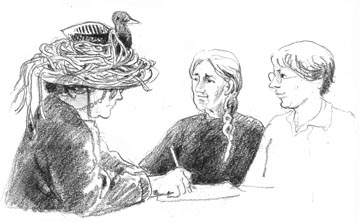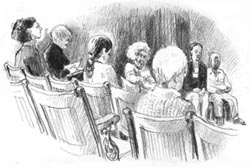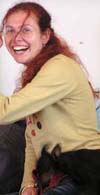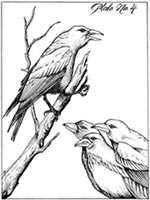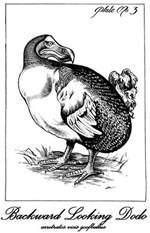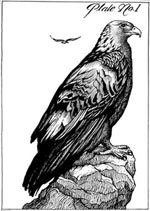Spark, September 2010
| SPARK 15 Rutherford Place New York, NY 10003 |
||
| New York Yearly Meeting News | ||
| Volume 41 Number 4 |
The Religious Society of Friends (Quakers) | September 2010 |
| Editor, Paul Busby | ||
Contents
Friends and Humor—Not an OxymoronEleanor Novek, Manasquan Meeting Some say God gave humanity humor in order to lighten our hearts. Others say He uses it to teach us about our shortcomings. Scholars point to plentiful wordplay in the Bible, including jokes, puns, riddles, irony, parables, caricatures, and sarcasm. With respect to the role of laughter in our lives, Ecclesiastes 3:4 famously notes that there is “a time to weep and a time to laugh,” and Proverbs 17:22 observes that “A joyful heart is good medicine.” Though laughter may not be the first thing on our minds when we sit down in meeting for worship, humor can be present in any gathering, even those attuned to the Spirit. Earthly distractions (like the insistent chirp of a bird on a branch outside the meetinghouse window, or the furtive unwrapping of a throat lozenge) may provoke a giggle, but sometimes the impulse to laughter seems to stem from a Divine source, deep within. My experience of God is touched with humor. His majestic creation, filled with infinite variety and playfulness, is described in Psalm 104, which envisions all manner of living things great and small, and even the great Leviathan, amusing himself in the ocean. When I see a tiny spider at work in the garden, diligently packing up the threads of the silken masterpiece he had worked so hard to weave the night before, I am moved to smile. The starlings bathing in a puddle after a rain shower, the goofy sideways scuttle of crabs near the shoreline—all these spring from the master of joy. During meeting for worship at my first visit to Summer Sessions at Silver Bay, I was annoyed by the sounds of children playing right outside the auditorium. The wooden seat was hard, and I found myself grumpy and unable to settle. How would I ever be able to focus on worship with all that racket going on? All of a sudden one of those young voices piped out, loud and clear, “Can’t you hear me?” The meaning was suddenly clear: in the laughter and play of children, “Can’t you hear Me?” I laughed and, chastened, let go of my impatience. The Catholic theologian G. K. Chesterton said, “Angels can fly because they take themselves lightly,” and today a number of Quakers are using social media to live this truth. For example, “I Bet I Can Find 1,000,000 Quakers on Facebook” is an optimistic group that actually numbers about 4,200 members so far. (Are they all Friends as well as Facebook friends? Let us hope!) Also on Facebook, “The Association of Bad Friends” attracts people who poke fun at themselves for not quite living up to their Quaker ideals. “Angry Quakers” is a cartoon blog that does something similar. And while Friends are using video to spread Quaker testimonies to the wider world on YouTube, some souls also post more playful work, like a dance party breaking out in a silent meeting at Pendle Hill, some enthusiastic rapping about Quaker beliefs, even a commercial for George Fox. When we laugh, we drop our expectations about how things ought to be and stop trying to control them. We step away from our bullying egos. We feel physically lighter, as laughter releases endorphins in our bodies. In this state, we are ready to listen to God’s promptings in our lives, and to hear His gentle laughter. This issue of Spark is dedicated to Friends and humor. It contains articles that deal seriously with the relationship Quakers have to laughter, and the application of humor in deepening our connection to Spirit. You will also find lighthearted essays meant to make us smile at the peculiar ways of Friends. We hope you will enjoy them. Things I Ponder While Sitting in MeetingPhilip Gulley, Fairfield Meeting (Western YM) Nearly every Sunday morning we have visitors to our Quaker meeting for worship. They enter the front door tentatively, peering around the 1892 meetinghouse, taking in the oaken pews, the fine cracks in the horsehair plaster, the carved pulpit, raised in 1957, when Gene Lewis, 6 foot 4, was our pastor. The pulpit had been made in the early 1900s under the ecclesial leadership of Sarah Woodard, 5 foot 2. A Regulator clock hangs next to the door. Dick Givan wound it each Sunday morning. Dick was the chief justice of the Supreme Court of Indiana, but until his death was our resident clock winder, dish washer, and snow shoveler. The customary responses when people discover I’m a Quaker are, one, “I thought you all were dead,” two, “Aren’t you like the Amish?”, and three, “The oatmeal people, right?”
Though the Bible warns against pride, we Quakers take a certain pleasure in our eccentricities. We don’t vote on church matters, and mistrust would-be bishops. When we don’t agree on a matter, we talk about it—sometimes for years. There is too much hardball in religion today, too much invective and taking no prisoners, much of it piped through the air and into our homes, telling us whom to hate and what to fear. The Quakers in my meeting joke about striking back, televising our meeting for worship—120 Quakers sitting on oaken pews in an 1892 meetinghouse, a little singing, a dab of preaching, then 30 minutes of silence, with viewers whacking their televisions, thinking they’ve gone on the blink, jabbing the volume button on their remote, their anger mounting. I’m not sure whether our visitors are put off by our low-church simplicity or charmed by it, but I can usually tell who will come back for another visit. Men wearing ties seldom return. I sit on the liberal side of religion, at God’s left hand, but dress conservatively, and am hard to pin down. People carrying big Bibles usually don’t come back. We have perfectly serviceable Bibles in our pews and see no need to arm ourselves with additional copies. One Sunday a man visited carrying a Bible so large it needed built-in wheels. He didn’t make it halfway through meeting for worship. I’m embarrassed to admit it, but when I saw him I was reminded of Little Red Riding Hood and the wolf. “My, what a big Bible you have,” said Little Red. “All the better to bludgeon you with,” answered the wolf. Men who are handy with tools think twice about returning. They spend the hour studying our old meetinghouse, envisioning a lifetime of indentured servitude stretching before them. We reel them in slowly, first asking them to replace a fuse, and they agree. The hook is set. Within the next year we’ll have them balancing precariously on ladders, painting soffits and re-reroofing the meetinghouse. If they should fall from the ladder and perish, we Quakers do a wonderful job with memorial services. If you are fortunate enough to expire in the bosom of a Quaker meeting, you will receive a send-off like no other. Dozens of people will testify of your fine qualities, whether you had any or not. I once conducted a funeral service and had 13 members of the deceased’s family join our meeting the next week. In the 21st century, this is what it means to be Quaker in my neck of the woods, retaining some traditions while jettisoning others. It remains to be seen whether we have distinguished correctly between the essential and the trivial. I ponder these matters and more, while sitting in meeting, the Regulator clock subtracting the minutes until we shall meet the Lord. Philip Gulley is pastor at Fairfield Friends Meeting near Indianapolis. This essay, previously performed on PBS’s Across Indiana with Phil Gulley’s “Porch Talk,” is used by permission of the author. Tweeting for Worship—
|
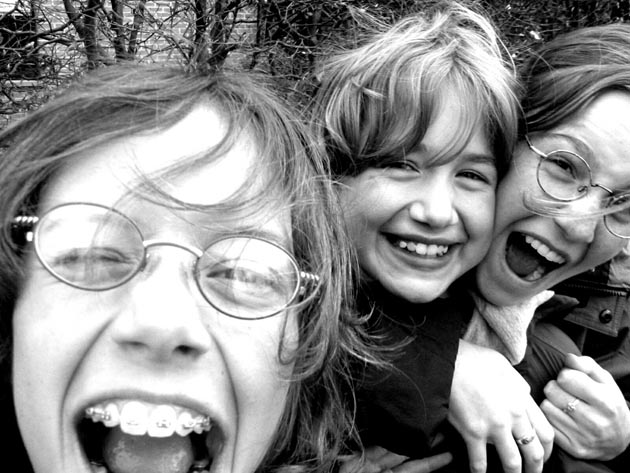 |
![]()
Love and Laughter in Delight:
One Friend’s Musings
Chris DeRoller, Old Chatham Meeting
My work has deepened my understanding of many things for which I am most grateful. A big one, a given, a “duh” really, is that we need to love and to be loved. Trouble is, I don’t think we can will ourselves to love. I don’t think we have very much control over love at all. My experience is that love is always a gift. And often it’s a surprise. I can make myself consider how another might feel. I can make myself look at them with tenderness. But I cannot make myself love them. To love and to be loved is Grace.
Right up there with Love is the tremendous power of genuine laughter: that authentic, from-the-belly, fill-the-whole-soul kind of laugh. The kind that draws others to you, that is an invitation to the world to connect with you. To me, that deep laughter is a uniquely human expression of Love. It is also a gift. It’s not always reverent, but I think it’s always holy, always healing.
I used to think of Spiritual Disciplines (in the rare moments that I did think of them) as akin to homework, or soccer drills, or early-morning exercise routines: something that, if I plugged away at long enough and faithfully enough, would eventually lead to divine rewards. What I have discovered instead is that they are about preparing oneself to receive Love. To me that makes compassion, humor, and even play, spiritual disciplines: practices that soften my heart, that open me to the possibilities around me, that make me vulnerable to losing myself completely to Love. And the cool thing is, the more I use them, the easier to use they become.
I’ll start with play, because when you make play a spiritual discipline, you open up “God” to lots more people, young and old, those who speak the same language as you and those who don’t. Humorous play, the kind that results in laughter, openness, and connection, is a form of surrender. It teaches us to let go. When done well, it requires us to be completely present. Creative play exercises the imagination. It opens our minds to other ways of seeing. When done well, it develops empathy and leads to compassion.
Compassion and humor are practices of perspective and perception, ways of looking at the world. Compassion involves seeing through another’s eyes and thus understanding. It is seeking the essence of the other, the true goodness in the other. It readies the heart for Love. Humor is looking at something upside-down, inside out, or straight on and pointing out the obvious. The best of humor comes from true delight in the world and is fed by compassion.
Delight in recent years has become one of my favorite words. De…Light. Of the Light. From the Light. Laughter lightens the heart. In a room full of seriously busy people, humor energizes and buoys us. When we smile, our eyes sparkle. I’ve found that delivering discipline with loving humor is a light touch, easier for others to respond to. I’ve witnessed gentle humor bringing difficult things to light in a loving way.
I was Catholic as a kid. Jesus nailed to a cross. Jesus with a crown of thorns on his head. Jesus with hands outstretched mourning his betrayal by Judas. These were common images to me. One day I came upon a charcoal picture of Jesus laughing, head thrown back, eyes full of light. A friend remarked to me, “This is the Jesus the little children were drawn to.” Then I felt as if I knew Jesus.
I’d love to see a picture of George Fox and Margaret Fell full belly laughing together. I think it would be good for us Friends.
Chris DeRoller plays for a living as codirector of the Powell House Youth Program. She has recently—completely, and totally by surprise—fallen in love with sailing.
From Fly Creek:
All Spill, All Get Dumped On
James Atwell, Butternuts Meeting
My local readers have long since figured out that the Fly Creek General Store is my second home. I love the dog-eared ambiance and especially Tom Bouton’s banter with staff and with the regulars—Gordy, Pete, Mary Ann, Mike, Karen, and a half dozen more who love to laugh and to thrust and parry with one another. What a place! No wonder it feels like home.
At least, almost always. I don’t know his name, but there’s a guy who sometimes blusters through the door inside a toxic cloud that can smother the fun. I’m guessing his belligerence (head down, shoulders rolled forward, hands often in tight fists) bespeaks a powder keg of anger and frustration inside him. And his talk matches his appearance. He scowls, then growls and gripes about most anything that comes to mind. His team has just lost to a bunch of jerks. He hates his work. Taxes are crushing him. Salesmen try to swindle him. And on and on.
Tom Bouton, bless him, understands this guy; he kids him along, but always with a special gentleness. Tom, I suspect, knows a lot more about him than the rest of us do. We just drink our coffee and wait for the storm to move on, out through the door.
But recently this anonymous man did something so contemptible that I felt like taking my cane to him. I had along my ash cane, bought years ago in England’s Lake District. I’d chosen it from a display of ruler-straight canes for two reasons. First, it had a slight double curve in its length. I’d been the last kid picked in a lot of games 60 years ago, I didn’t want that cane to end up alone in the display. Second, the cane had a graceful, beautifully grained bole as its grip.
That bole, swung in a long arc, was just what that bozo was asking for. And I’d have let him have it except for my being old and wobbly and easily pounded right into the floor. And of course, I’m a Quaker and shouldn’t even think of breaking somebody’s nose with a cane. So I suppressed temptation at once. But I’ll tell you what raised it.
On that morning the man came in and let the door close in the face of a pretty woman who’d followed him from the car. As he headed for the coffee, he called over his shoulder, “You get the Danish and pay.” She did this dutifully as he began to fill the largest of the paper cups, a 24-ouncer. But in putting on the lid, he flipped the cup and dumped a pint and a half of coffee across the counter and onto the floor.
The surly man’s reaction, I suppose, was predictable. He stepped up to the deli counter to yell at staff. “Could we get some towels out here?” he shouted. “There’s spilled coffee on the floor.” The tone was what first made me want to grab the cane. Veiled accusation toward the staff. And then the passive voice, exonerating himself. “There’s spilled coffee” indeed! But it got worse. He then barked at his wife by name. She was still at the register, halfway down the store.
“Get over here and help with this mess!” She came at once. His idea of help turned out to be stepping back while she dried the counter and then knelt to sop up the floor. Meanwhile, he filled himself another giant cup and capped it successfully. “There’s more under the coffee machine!” he said, and then went out the door to their car. When the woman was done, she drew her own coffee and followed him there.
Oh, shame on Quaker me! As that cretin was filling his second giant cup, I was imagining swinging the cane’s heavy bole, not at him, but smack down on the cup, squashing it explosively and perhaps scalding him, just slightly. I didn’t, and probably not for noble reasons. But that poor woman! What a life she must lead.
And that poor man, too. What a torture it must be to be what he is, and so to miss out on life’s joys —and especially on appreciating the love and loyalty of that good woman. If he happens to read this, here’s my hope for you, friend:
I hope that you’re freed of whatever in you causes you to rage at life. I hope you realize that we’re all rained on by fate; probably we’re meant to get humble from it. I also hope that you catch on that making mistakes comes with our flawed nature. We all spill coffee (just ask Tom Bouton); and, again, our clumsiness ought to put us in our place. Oh, and I dearly hope you come to see that life’s greatest blessing is love shared with a dear and loyal partner. You have that, buddy. Be grateful, and tell her so.
I’m also tempted to send a message for your patient lady: “If he pulls that kind of stunt at home, you don’t need a stout cane. A cast-iron skillet will do the job.”
But I won’t send that second message. Good Quakers never say such things.
Jim Atwell and his wife live on a Fly Creek, N.Y., farm with chickens, sheep, dog, and cat. He’s been a freelance writer for about 20 years. This piece will be in his forthcoming book, Wobbling Home: A Quaker and His Parkinson’s.
Clerk's Letter
Beloved Friends,
We have much to reflect on from our Summer Sessions! We continue to change and grow, individually and corporately, in ways that are exciting, uplifting, and occasionally terrifying.
The minutes of our sessions are available in full on the Yearly Meeting Web site. We heard powerful reports of witness and ministry. Indian Affairs Committee will be asking meetings to labor with them on their minute endorsing the United Nations Declaration on the Rights of Indigenous People and repudiating the Doctrine of Discovery. Our Friday night session ran late. Some Friends found the session difficult; others found it a matter of course. The recommendation from the Liaison Charge Group was held over for further seasoning. It was disappointing not to get to hear a report from Young Friends in Residence.
The Saturday of Summer Sessions I awoke with the thought: We cannot know now what blessings will come from this time together. We can only move forward in faith, humility, and love. It is the shadows and spider webs that make the light stand out in greater relief. What have we seen that we get to work on together, as a community of faith?
Coming back to my home meeting, I wonder, Why do we get grumpy with each other? Is it simply tiredness? Being human? Is it a lack of knowing each other, of trusting each other? Would a deeper faith bring us closer to the center, and to each other? Are we being faithful in listening for the Inward Teacher, whatever form the message and the messenger may take?
A week after the close of our Summer Sessions, Friends gathered at Poughkeepsie Friends Meeting for the memorial meeting for our young Friend Natia Gorgen, daughter of Rachel Ruth and Paul Gorgen, who died in a car accident. The loss of a child brings us to our knees, and beyond, both literally and spiritually. The following Saturday Friends celebrated the marriage of Rachel and Paul’s oldest son, Perry, to Tess Howard at Poplar Ridge Meeting. As was said that day, the heart is a big country, with room for both grief and joy. Please continue to hold Rachel and Paul and their sons Perry and his wife Tess, Nate, and Sam in the Light, and to reach out to them with your stories, prayers, and love.
In loving friendship, your no-longer-a-rookie clerk,
Heather M. Cook (Chatham-Summit), clerk, New York Yearly Meeting
clerk [at] nyym.org
Building Vital, Vibrant Regional Meetings
Friday, November 12, 2010 • Flushing Monthly Meeting
Heather Cook, clerk, NYYM
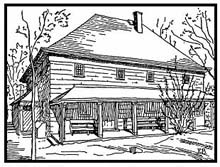
Do you carry a concern about the vitality of our regional, quarterly, and half-yearly meetings? What do we have to share and learn about each other’s regional structure and distinctive character? Do you wonder if others are more vital, or want to see why another does and doesn’t do some things? How do the monthly meetings relate to and support each other with or without the benefit of much regional organization? What do you want more of in your region? How does your region serve monthly meetings and worship groups in useful ways?
If any of these queries speaks to you, or if you have related ones, you are invited by the Yearly Meeting clerk, Heather Cook (All Friends Regional Meeting), worshipfully to consider these and other questions on the Friday of Fall Sessions, at Flushing Meeting, from 5:30–8:00 p.m. This gathering will be an opportunity to start this conversation and to see if there is interest and energy in continuing at another time. Please bring food to share.
Please e-mail the Yearly Meeting clerk at clerk [at] nyym.org about your intention to participate by October 28, to help the planning.
Clerks Gathering
Saturday, October 30, 2010
Oakwood Friends School
Poughkeepsie, N.Y.
Heather Cook, clerk, NYYM
From profound spiritual growth to practical nuts-and-bolts skills building, clerking brings challenges and joys that are sometimes far outside our expectations. In your service as clerk of a meeting or committee, whether in your monthly, regional, or yearly meeting, what has surprised, baffled, changed you? Do you have questions and want information?
The clerk of the Yearly Meeting invites all clerks to gather to share experiences of spiritual growth, best practices in clerking, and questions on Saturday, October 30, in the Upper Library of Oakwood Friends School in Poughkeepsie, N.Y.
We will start at 9:30 a.m. with fellowship and continental breakfast, settling into worship at 10:00 a.m. Lunch will be available for $5 (please bring cash or check), or you are welcome to bring a brown-bag lunch. We will finish by 4:00 p.m. Limited overnight hospitality will be available with a minimum two weeks’ notice (more is better!).
Please e-mail the Yearly Meeting clerk at clerk [at] nyym.org about your intention to participate, by October 15 if possible, to help the planning. Please include whether you would like the following:
- a school lunch
- to be picked up or taken to the train station (please include the time of the train’s arrival or departure)
- a bed on Friday and/or Saturday night.
Worship about Finances
Budget Saturday
October 2, 2010
Purchase Meeting
F. Peter Phillips for the inancial Services Committee
Every year, Friends who serve as treasurers for monthly, quarterly, regional, and half-yearly meetings are convened by the Financial Services Committee at Budget Saturday. This year, Budget Saturday will take place at Purchase Monthly Meeting on October 2. All Friends are welcome to join in the worship. We will meet at 9:00 a.m. for hospitality and settle into worship at 9:30. We expect to adjourn no later than 4:00 p.m.
At Budget Saturday, Friends share ministry on the proposed programs and activities of New York Yearly Meeting, and on the ability and clarity of the monthly meetings to support that work. In worship, our leadings are held in the Light and tested against our abilities to execute them. In anticipation of Budget Saturday, each monthly meeting clerk and treasurer received a draft expense budget during August, with a request that, at their September meetings for worship with a concern for business, each meeting indicate its likely level of covenant donation in support of the proposed work. Each quarter will attend Budget Saturday with an estimate of the expected level of support.
Budget Saturday is an opportunity to share deeply felt ministry and to renew our unity of vision as a Yearly Meeting. The Financial Services Committee hopes that many Friends are led to attend and participate in our worship that day.
Last Call for Contributions to November Spark!
Topic: Holidays—Special Occasions—Celebration
Traditionally Quakers have held that no day is more sacred than any other. The keeping of “times and seasons” among early Friends was widely viewed as frivolous distraction.
As contemporary Friends, navigating in a less rigid, more complex world, we are challenged by having to interpret this testimony for ourselves.
What is your (or your meeting’s) interpretation of this early Quaker call to recognize and uphold the holiness of all things?
Do you (or your meeting) struggle with how a Quaker “should behave”during a holiday or special occasion?
How does your meeting meet and greet certain holidays or occasions?
Do you celebrate? What do you celebrate? How?
Have you let go of certain holidays or traditions and let in something else, possibly more deep and meaningful, to take their place?
Let us hear from you! Your willingness to share your experience, discomfort, and joy deepens our fellowship.
Article length, 750–1,200 words; submission deadline, October 1, 2010.
Please let the coordinator, Robin Whitely, know of your intention to submit: 973-376-2392; rlwhitely [at] comcast.net, with a copy to Spark editor, Paul Busby, paul [at] nyym.org; 212-673-5750.
Everyone Can Be a Nightingale!
The joyous Nightingales will be at it again, singing from their hearts and songbooks, October 8–10, 2010, at Mohawk Valley Monthly Meeting. Modeling themselves after a Northern Yearly Meeting a cappella singing group, Friends in NYYM have been gathering to share fellowship, food, and the great joy of singing together the songs that move them. Nightingales always emphasize that the experience is open to all: “It is not about being a great singer. It is about being in a community singing with love.” A very modest fee for the weekend is involved. For more specifics about the weekend, including accommodations and transportation, contact Christopher Sammond at nyym.gensec [at] gmail.com or 212-673-5750.
YFIR Job Opening
Young Friends in Residence (YFIR) is looking for an intern to start February 1, 2011. The intern will work in Newfield, N.Y. (ten miles outside of Ithaca), at the Beloved Community House and will live in intentional community with three other interns. The work includes developing and facilitating a youth program for sixth through ninth graders. Interns are encouraged to immerse themselves in the local community and participate in the life of Perry City Monthly Meeting and the wider Quaker community. There is a small monthly stipend ($200 per month) plus room and board.
For more information, including a job description and application, please contact Chris DeRoller at 518-794-8811 or e-mail us at YFIRwg [at] gmail.com.
Notices
This column is prepared from information about membership received from the local meeting recorders.
New Members
Lee Arnold—Brooklyn
Patricia Close—Purchase
Kirsten Cole—Brooklyn
Ezekiel Frackman—Brooklyn
Maxwell Frackman—Brooklyn
Greg Galina—Rockland
Siobhan Glynn—Brooklyn
Andrew Holz—Rahway-Plainfield
Shannon Kincaid—Manasquan
James Malchow—Rahway-Plainfield
Michael Quinland—Westbury
John Scardina—Purchase
Deborah Sims—Rahway-Plainfield
Madeline Josephine Wagner –Brooklyn
Transfers
Rik Panganiban to Brooklyn from Fifteenth Street
Michael Phillips to Brooklyn from Fifteenth Street
Kitty Ufford-Chase to Rockland from Pima Meeting
BirthsAdoptions
Ayla Rae Bugdaycay, on July 7, 2010, to Beth Bugdaycay, member of Morningside, and Murat Bugdaycay
Sophie Lucine Buffam, on May 7, 2010, to Ishi Buffam, member of Poplar Ridge, and Magdalena Wiedermann
Deaths
Willard Gaeddert, member of Fredonia, September 4, 2010
Natia Gorgen, member of Poughkeepsie, July 27, 2010
Martha Grutchfield, member of Morningside, August 12, 2010
Arthur Hammell, member of Jericho, July 1, 2010
Carolyn Mallison, member of Syracuse, August 1, 2010
Samuel Mitchell, member of Jericho, July 12, 2010
Rodney Morris, member of Poplar Ridge, April 21, 2010
Stanley Quinn, member of Shrewsbury, May 30, 2010
Arthur Ritz, member of Fifteen Street, May 2, 2010
Shirley Rundle, member of Poughkeepsie, June 27, 2010
George Seiler, member of Saratoga, August 3, 2010
Curtis Seyfried, member of Brooklyn, May 22, 2010
Monika Trumpi-Arnold, member of Poughkeepsie, April 23, 2010
Paul C. Williams, member of Fifteenth Street, August 25, 2010
A memorial and celebration of Carolyn Mallison’s life will be held Saturday, November 20, in Ithaca. For information contact Carol Mallison at gimmechocolate [at] twcny.rr.com.






